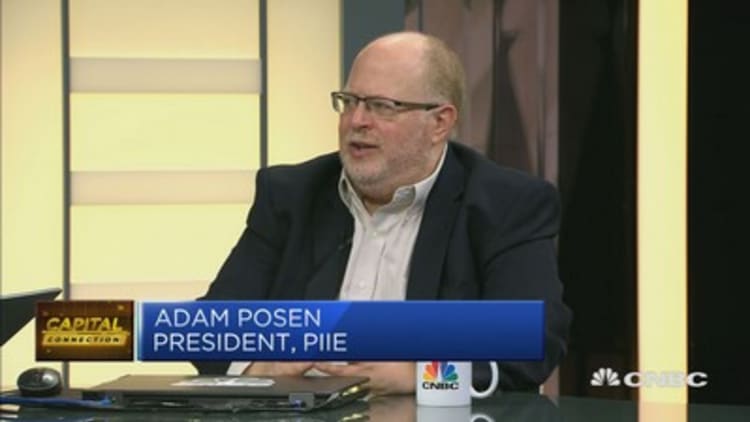
The legal advisor for the European Union's top court said Tuesday that the U.K. can cancel Brexit without asking for permission from other EU member states.
Sterling quickly rose to session highs after the news, trading at around 1.2806 against the dollar at 9:20 a.m. London time, after trading near $1.2720.
A group of Scottish lawmakers have sought a legal ruling on if and how the U.K.'s request under Article 50 to leave the European Union could be unilaterally revoked before the Brexit deadline of March 29, 2019.
Article 50 allows a country to trigger the process that takes them out of Europe's political and economic union. U.K. Prime Minister Theresa May invoked the exit clause in March 2017.
Backed by a crowdfunding appeal, the case has been put together by a cross-party group of Scottish politicians, along with the high-profile barrister Jolyon Maugham QC. The final ruling on whether Article 50 could be canceled without input from the EU's other 27 countries will be granted by the Court of Justice of the European Union (CJEU).
What happens now?
The European court has already held the hearing, taking evidence from the group of lawmakers who said they wanted clarity to help decisions made by the U.K. Parliament. The British government has opposed the case, arguing it is a politically-motivated bid to frustrate Brexit.
The court also heard from lawyers representing the European Commission and Council of the European Union — which is the executive arm of the EU and the institution that represents member states' governments. They argued that revoking Article 50 should involve unanimous agreement from the other 27 nations.
The EU is worried that allowing a country to trigger Article 50 and then reverse the decision with no additional input could become a tool for those unsatisfied with the policies of Brussels. For the U.K. government and pro-Brexit politicians, there are likely concerns it could pave the way for a second referendum, giving the public an option of remaining in the EU.
The non-binding opinion of Advocate General Manuel Campos Sanchez-Bordona was issued on Tuesday. But the full ruling will follow within days, though it's expected that the opinion of the advocate general will almost certainly be followed by the panel of judges.
Will it make any difference?
Not according to the U.K. government. May's team have stuck fast to the message that her deal is the only reasonable outcome of Brexit and that Britain will definitely leave the European Union on March 29 next year
In a statement the Department for Exiting the EU further played down the case's importance: "The government has made submissions to the CJEU. In any event, the government will not be revoking Article 50."

But writing in The National newspaper on Monday, one of the case's backers, Alyn Smith, argued that U.K. lawmakers were now "vulnerable to the government claims that there is no alternative to Brexit."
Smyth, a Scottish National Party member of the European Parliament, who opposes Brexit, added that "We might just find that it will be The Scottish Case that gets us out of this."
Journey through the courts
The initial request for a judicial review was rejected by Scotland's highest court, as the judge argued that the question of reversing Brexit was hypothetical, and that the matter encroached on the powers of the U.K. Parliament.
But appeal judges overturned that decision, noting that matters had moved on with the agreement of the Withdrawal Bill which sets out how Britain and Northern Ireland will leave the EU.
The British government then attempted to block the review's passage to Europe's highest court, arguing that the U.K.'s Supreme Court should first consider the case.
But that last-ditch appeal was turned down by Scotland's most senior judge who noted that delaying the final ruling any longer would risk pushing a decision beyond the wider U.K.'s "meaningful vote" on May's Brexit deal which is set to take place in the House of Commons on Tuesday December 11.


